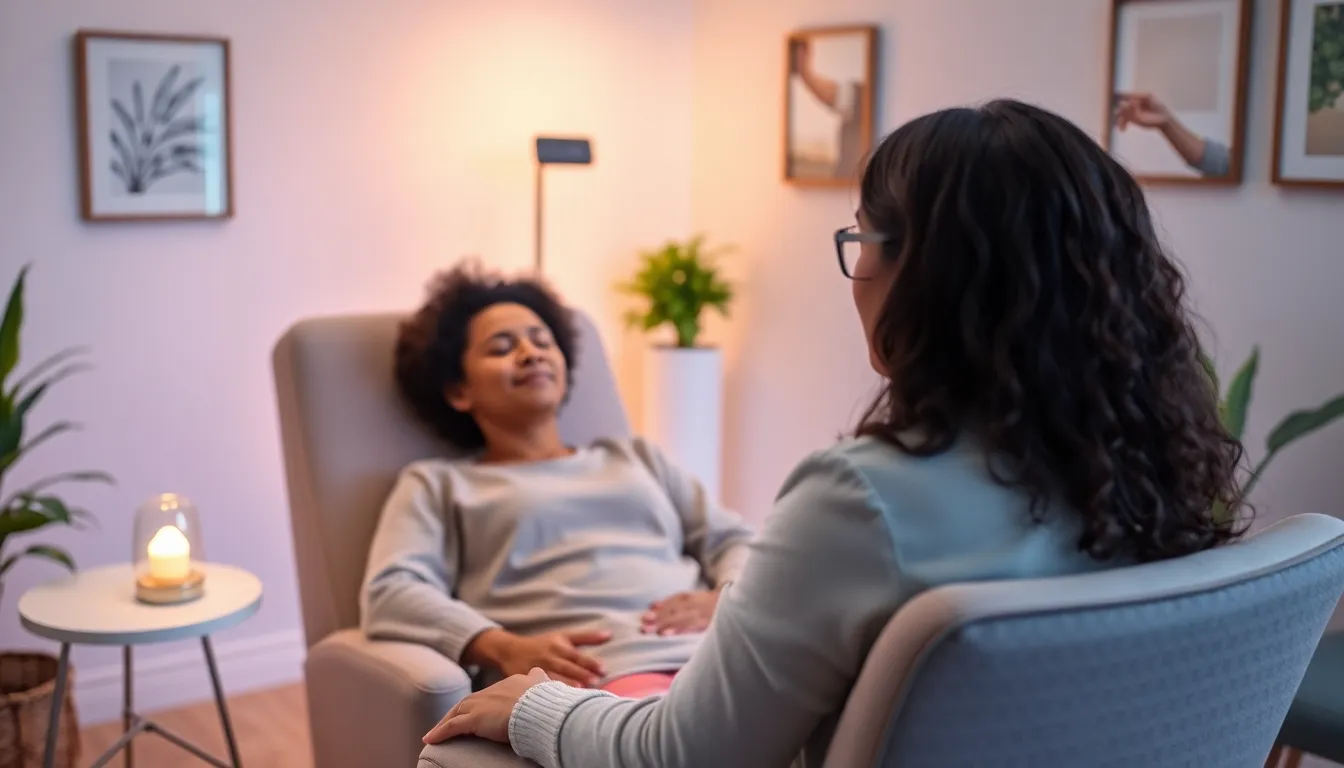Table of Contents
ToggleHave you ever tossed and turned at 3 AM, staring at the ceiling, while your mind races through tomorrow’s to-do list? It’s a familiar struggle for many, and the solution might not be as elusive as you think. Enter sleep hypnotherapy: an intriguing blend of relaxation and suggestion aimed at transforming your sleep patterns. Think of it as a bedtime story for grown-ups, one that invites the subconscious to take the reins and drive you to dreamland. With a sprinkle of science and a dash of intrigue, let’s jump into how sleep hypnotherapy could be just what you need for a good night’s rest.
Understanding Sleep Hypnotherapy

Sleep hypnotherapy is a specialized form of hypnotherapy aimed at addressing sleep-related issues. But what exactly does this entail? In simple terms, it combines relaxation techniques with hypnotic suggestions to help individuals overcome barriers to restful sleep. While it might sound mystical, it’s actually grounded in psychological principles. The goal here is to guide individuals into a deeper state of relaxation, allowing the subconscious mind to accept positive suggestions that promote better sleep.
This form of therapy can be beneficial for various sleep problems, including insomnia, sleep apnea, and even chronic nightmares. Using techniques that help to create a state of focused attention, hypnotherapy offers a path to reprogram the brain’s responses to sleep-related challenges. And it’s not just for those facing serious sleep issues: many people find it useful simply for improving their overall sleep quality.
The Science Behind Hypnotherapy and Sleep
The science of hypnotherapy is fascinating in its interplay with sleep biology. When an individual enters a hypnotic state, the brain waves shift, moving into a more relaxed frequency similar to that seen in light sleep. This transition allows it to bypass the critical analytical mind and connect directly with the subconscious.
Research indicates that hypnosis can increase levels of melatonin, the hormone responsible for regulating sleep-wake cycles. Besides, brain imaging studies show that hypnotherapy can activate areas associated with positive emotions and calming signals. Hence, it’s no surprise that those who undergo hypnotherapy often report improved sleep onset and enhanced sleep quality. Essentially, this therapeutic practice harnesses the power of suggestion and the mind’s natural ability to heal itself.
Benefits of Sleep Hypnotherapy
The benefits of sleep hypnotherapy are numerous and substantiated by both anecdotal and clinical evidence. From alleviating insomnia to reducing anxiety levels, its advantages extend beyond mere sleep. Individuals have reported:
- Faster Sleep Onset: Many find they can fall asleep more quickly and effortlessly.
- Improved Sleep Quality: Those undergoing hypnotherapy often wake up feeling more refreshed and alert.
- Reduced Nightmares: Hypnotherapy can help in mitigating recurring nightmares and enhancing peaceful dreams.
- Anxiety Reduction: Many sleep problems stem from anxiety, and this therapy creates a lasting sense of calm.
- Increased Self-Esteem: A good night’s sleep contributes to improved mood and overall well-being.
These improvements can lead to a more productive day and better health overall.
Techniques Used in Sleep Hypnotherapy
Sleep hypnotherapy employs several techniques, each tailored to address specific issues. Some commonly used methods include:
- Progressive Relaxation: This technique involves gradually relaxing each part of the body, promoting a meditative state.
- Guided Imagery: Patients are guided to visualize peaceful scenes, effectively distracting the mind from stress and anxiety.
- Positive Affirmations: This involves repeated phrases that encourage positive thoughts about sleep, such as “I am calm,” or “I will sleep peacefully.”
- Ego-Strengthening Suggestions: These help affirm an individual’s self-worth and resilience against negative thoughts.
Each session can combine multiple techniques, offering a personalized approach tailored to the individual’s needs.
What to Expect During a Sleep Hypnotherapy Session
Entering a sleep hypnotherapy session can feel like stepping into a cozy cocoon. Typically, the session begins with an initial consultation, where the hypnotherapist gathers information about the individual’s sleep patterns and concerns. Here’s what one can generally expect:
- Warm Environment: The sessions are usually set in a calm and comfortable space to help relaxation.
- Induction: The hypnotherapist will guide the individual into a relaxed state, using soothing language and techniques to induce hypnosis.
- Therapeutic Suggestions: While in this state, suggestions will be made to alter perceptions and feelings about sleep.
- Reawakening: Sessions usually conclude by gently bringing the individual back to full awareness, leaving them relaxed and rejuvenated.
Post-session, individuals are often encouraged to reflect on their experiences and maintain a calm mindset before bedtime.
Common Misconceptions About Sleep Hypnotherapy
Even though its effectiveness, sleep hypnotherapy is often shrouded in myths. Let’s clear up some misconceptions:
- Myth 1: It’s Mind Control: Many believe they’ll lose control, but individuals remain fully aware and in command.
- Myth 2: It Only Works for Severe Conditions: Not true. Even mild sleep disturbances can be addressed successfully.
- Myth 3: You Need to Be Highly Suggestible: Everyone can benefit, regardless of their susceptibility to hypnosis.
Debunking these myths is crucial for understanding the real power of hypnotherapy.
Finding a Qualified Sleep Hypnotherapist
Choosing the right sleep hypnotherapist is essential for a successful experience. Here are some tips to ensure you find a qualified professional:
- Credentials Matter: Look for a certified hypnotherapist with a background in psychology or therapy.
- Specialization: Ensure they specialize in sleep issues, as this adds credibility to their expertise.
- Recommendations: Seek referrals from friends or healthcare providers.
- Trial Sessions: Many therapists offer initial consultations: use this opportunity to gauge comfort and compatibility.
Finding the right match can make all the difference in your hypnotherapy journey.





